Group Leader Describes Fatal Polar Bear Attack on Horatio Chapple, 17

The leader of an expedition in which a 17-year-old Eton schoolboy was killed by a polar bear has written of the attack for the first time, describing how they attempted to fend off the beast after a rifle failed.
Spike Reid, 29 at the time, was in charge of a group of 13 people, mostly teenage students, and describes how they set up camp on the edge of a glacier in Spitsbergen, an island in Norway's Svalbard archipelago.
He says they did not have a night watch, because they believed the chance of attack was low, but they had built a perimeter fence.
"Somehow a polar bear got through our defences without firing the flares," writes Reid, in Sir Ranulph Fiennes' book Cold: Extreme Adventures at the Lowest Temperatures on Earth.
He describes how the animal tore through a tent in which Horatio Chapple and two others were sleeping.
Reid aimed his rifle at the bear, which had dragged Chapple out into the open. He says that despite trying to fire it four times, the gun would not work and the bear charged at him and bit into his head.
It stopped when co-leader Andy Ruck threw a rock at its head, and then charged another student who had "valiantly" picked up the rifle.
Other members of the group fled and tried to hide, and two teenagers were mauled before Reid managed to reload the gun with a round that had fallen to the ground and shot the animal dead.
Chapple's parents have previously called for the group's leaders to be prosecuted, but Norwegian authorities ruled that although the death was preventable, they did not bring criminal charges.
A report into the incident by the British Schools Exploring Society, which organised the trip, has been delayed until shortly before Chapple's inquest.
© Copyright IBTimes 2025. All rights reserved.






















